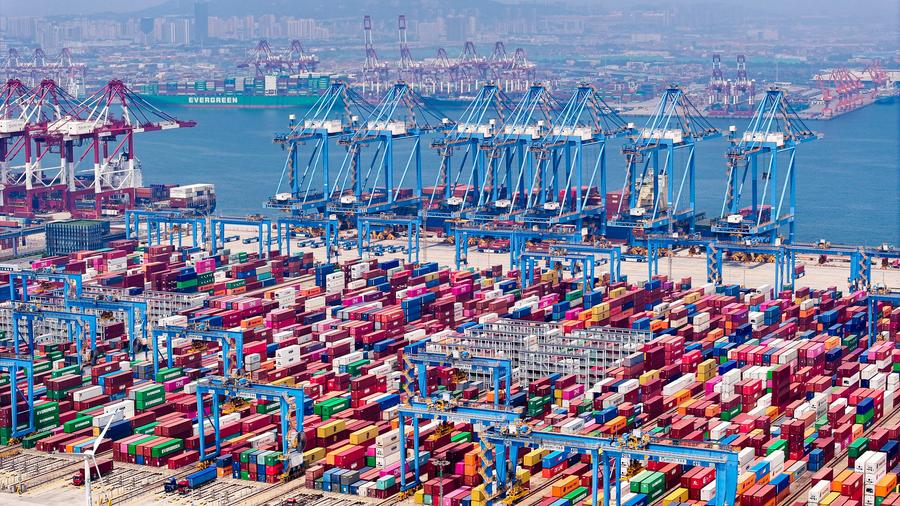
 0 Comment(s)
0 Comment(s) Print
Print E-mail China Daily, August 31, 2024
E-mail China Daily, August 31, 2024
China is taking solid steps, including accelerating the introduction of a new, shortened negative list for market access, to optimize the business environment and inject strong impetus into the economy, officials said on Friday.

An aerial drone photo taken on July 3, 2024 shows a fully automated container terminal of Qingdao Port in operation in Shandong province. [Photo/Xinhua]
The move came after China unveiled a guideline last week to improve its market access system, signaling the country's latest push to implement reforms listed in the resolution adopted in July at the third plenary session of the 20th Central Committee of the Communist Party of China.
Experts said the country's ongoing efforts to refine its market access system and remove barriers have showcased China's firm determination to promote a better combination of efficient markets and competent government, which will help further stimulate market vitality, foster new quality productive forces, and promote high-quality development over the long run.
Li Chunlin, deputy head of the National Development and Reform Commission, said the commission is currently working with the Ministry of Commerce, the State Administration for Market Regulation and other departments to advance the revision of the negative list in an orderly manner.
A negative list indicates areas where investment is prohibited or restricted, while all other areas are presumed to be open.
"A revised version has been developed and will be issued for implementation after approval through the proper procedures," Li said at a news conference in Beijing on Friday.
He said the upcoming new version of the negative list will fully implement the requirements outlined in the guideline released last week to improve the market access system, closely aligning with a new round of institutional reforms including reforms of the administrative approval system and reforms for separating operating permits from business licenses.
"This will unleash more reform momentum for the country's high-quality development," Li added.
During the past few years, the country has made considerable progress in creating a business-friendly environment. So far, China has unveiled and revised the negative list four times, and the number of items on the list has been reduced from 151 in the 2018 version to 117 in the latest updated negative list for 2022.
In recent years, the NDRC — together with relevant departments — have abolished more than 20 negative lists for market access established by local authorities in violation of existing practices.
Citing China's stepped-up efforts to optimize market access, Guo Liyan, deputy director of the Economic Research Institute of the China Academy of Macroeconomic Research, said the country aims to build an open, transparent, rules-based market access system that will provide a level playing field, clearly define rights and responsibilities, and ensure effective oversight.
"Those moves mark key steps toward improving the system of equitable market access that is compatible with the development of new quality productive forces," she said. "It will provide strong support for accelerating the construction of a high-standard market system and building a high-level socialist market economic system."
Looking forward, Ren Duanping, director-general of the Business Registration Bureau at the SAMR, said China will continue to deepen reform of the registered capital management system and consistently reduce government-instituted transaction costs for market access.
"We will work to remove market entry barriers, and the key focus will be placed on addressing pain points and difficulties that people and business entities face," Ren said. "Efforts will be made to rectify improper market interventions — such as abuse of administrative power — to restrict trading parties and excluding operators from participating in bidding and tendering activities."
Song Aixian, a researcher at the NDRC's Economic System and Management Institute, called for joint efforts among government, businesses, industries and the whole of society to accelerate the construction of a fair, open, transparent and organically coordinated regulatory framework.
"It is advisable for the government to innovate regulation methods, improve intelligent regulations in key areas, improve risk monitoring and early warning mechanisms, and strengthen dynamic regulation in areas such as data, finance, grains, energy and strategic minerals," Song said.
Song added that more efforts should also be made to encourage businesses to fulfill their social responsibilities by integrating the concept of corporate social responsibility into production and operations, and encourage industrial organizations to provide support for market access regulation in terms of standard systems and certifications.
Go to Forum >>0 Comment(s)